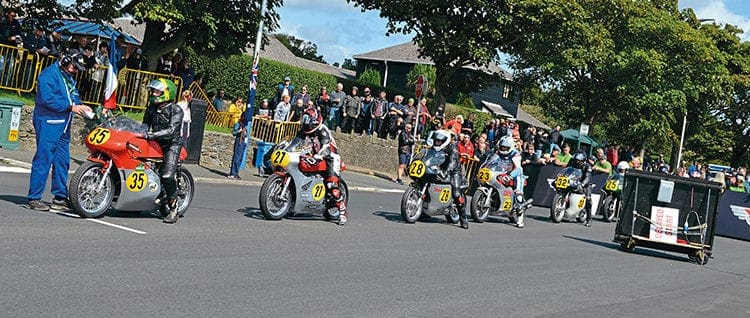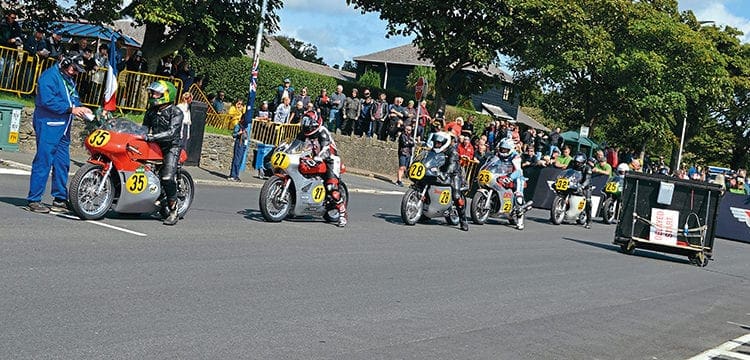
Motorcycle race paddocks are renowned for rumours, speculation and downright falsehoods, and there is no reason why the Classic TT paddock should be any different. In fact, quite the opposite is true, with teams and riders sharing the area behind the TT Grandstand for a couple of weeks there is plenty of time for rumours to grow legs. However, we at Classic Racer don’t deal in rumours, so we went right to the top and spent some time with Paul Phillips, the man who heads up the team who has taken the Classic TT an awful long way in just six years.
Q – Paul, six years in with the Classic TT are you pleased with the progress it has made in a relatively short time?
A – Yes. It has grown very quickly in all measurable areas and has delivered a lot of incremental benefit from the position it started from. My own personal view remains that this is an event with boundless possibilities and one that can continue to grow into the foreseeable future, becoming much more than just another motorcycle race. The combination of a beautiful venue, unrivalled heritage and what has become the most important set of classic motorcycle races on the planet is a potent mix.
Enjoy more Classic Racer reading in the monthly magazine.
Click here to subscribe & save.
Q – So is the event now delivering what the Government was seeking?
A – As of last year, the Festival of Motorcycling containing the Classic TT had generated, cumulatively over the six years, almost £22m worth of additional economic benefit compared to the original benchmark (the 2012 Manx Grand Prix Festival) and in the same period the Isle of Man Exchequer has benefited by an additional £3.2m of new additional income receipts. This is based on data extrapolated from independent economic surveys carried out on behalf of the department. This means that both the economic and exchequer benefit derived from this event has more than doubled during that same period. The increase in the number of visitors on its own equates to 6% of the total number of leisure visitors annually to the Isle of Man making it the fastest growing tourism event the Island has. These events are primarily funded on the basis of their value to the visitor economy, so growth on this scale is very satisfying to see. It’s important to remember that the Festival of Motorcycling, and the TT, rely on public funding and at a time when budgets are under great pressure we need to demonstrate that the events are able to deliver a commercial return on that investment that benefits all of the Island’s residents, not just appeals to the ones who have an interest in motorsport.
Q – According to some statistics, published visitor numbers were down for the Classic TT/Manx this year. Is this true, and if so what do you attribute this to?
A – The Isle of Man Steam Packet Company issued their passenger numbers for the dates that the Festival of Motorcycling covered, showing a slight year on year decline in some areas. This shouldn’t get mixed up with festival visitor numbers though. The economic survey for the event will be published in October and only then will we get a definitive handle on what the visitor numbers actually were. Whilst the numbers of people travelling to the Festival of Motorcycling by sea has risen each year since 2013, in overall percentage terms, sea travel has dropped from 90% of the total attendance in 2010 to 77% by last year with more and more people choosing to travel by air. We remain optimistic therefore that the trend of uninterrupted visitor growth will have continued in 2018, despite the less than ideal weather conditions.
Q – I get the impression that there is still a divide between your department and some factions of the MMCC. Is this a true assumption?
A – Meetings between the department and the MMCC happen with increasing frequency whilst the operational overlap is more evident than it has ever been during the Festival of Motorcycling years. The department has continued to invest hundreds of thousands of pounds each year into supporting the Manx Grand Prix, along with a huge amount of logistical and infrastructure support and is committed to its successful future. There may be that perception of divide but the reality is that the department is building strong working relationships with the MMCC who understand the economical and commercial requirements of the festival.
Q – I think it’s fair to say you have not enjoyed universal support from everyone involved in the Classic TT/Manx Grand Prix, but with a successful six-year run how can you see the event evolving?
A – My view remains that motorcycle racing on its own is not enough to sustain the current level of investment into the future and the Classic TT in particular needs to continue to grow and improve the off-track experience to present an event with wide appeal across different audience segments so it can continue to attract new visitors. We have already seen things like the Festival of Jurby, Show and Shine events, outdoor cinema, concerts, exhibits, pop up museums, displays and appearances from legendary riders from the past. I see this evolving further in the coming years with more and more off track content being established to entertain the visitors and locals alike.
Q – Race paddocks can always be relied on for a good rumour and one I heard more than once in August was that the classic races are going to be handed back to the MMCC to run as part of the Manx Grand Prix. Can you comment on this?
A – There are no proposals today to change the way the Classic TT is organised and delivered and we are currently planning the 2019 event. That said, these events are of course reviewed on an on-going basis, and it would be a department decision if they chose to change that situation in the future. Whatever the delivery model for this event, and the TT for that matter, the clearly defined policy and objectives for Motorsport of growing the visitor economy of the Isle of Man, generating commercial income and raising awareness through media coverage, will be the basis for any future delivery model of the event and will be attached to all future funding allocation.
Q – One criticism I heard from some of the smaller, regular classic race teams, was that the dropping of the Privateer status was a bad move. What was the thinking behind this?
A – The decision was taken due to the evolution of the event from the starting point in 2013. The system with the privateer status had become unclear and difficult to administer. There was too much subjective decision-making built into the way in which the categories were defined, it was causing a lot of operational headaches and conjecture and was in danger of becoming a farce. Nobody wanted that. The changes this year worked, from the perspective that everything operationally was much simpler, both from an organisational point of view and also for the competitors themselves. Where this hasn’t worked in my opinion, is the way in which we allocate the awards, in particular the replicas and we went on record before the end of this year’s event with a commitment to review this and make changes before next year.
Q – The classes themselves have evolved since the event’s inception and the smaller two-stroke classes appear very popular, but the Superbike class seems quite confusing for the average fan. Do you see any changes on the horizon?
A – I think the race schedule and the class structure works after some evolution and it is popular with fans and competitors as the growing number of entries and visitors bears witness to. Its success is reliant on people investing in machinery and to change the classes regularly would, in my opinion, be detrimental to the quality and quantity of the entry. The Superbike class doesn’t accurately represent any particular period of time in racing history but nor was it ever meant to. The eligibility rules were designed for the here and now and to encourage the best bikes, riders and teams to come together to put on the best spectacle for the fans. It probably represents the most eclectic mix of racing machines in any race anywhere in the world, with 500cc Grand Prix two-strokes pitted against 750cc four-strokes, 1100cc air-cooled monsters, 888cc Italian twins and the odd rotary Norton all thrown in for good measure. It is undoubtedly most popular with what I would call new fans of classic racing; people from my generation who are able to relive their racing memories through this race.
Q – And finally the one thing that you have no control over, the fickle Manx weather, conspired against you this year with some of the entertainment being cancelled. Is there any way you could make use of the hospitality unit to move some of it indoors?
A – As someone who has spent a career working on outdoor events, rain is my nemesis. The weather this year was pretty unprecedented and events across the UK were hit hard with many being cancelled or severely curtailed, not least of course the British round of Moto GP at Silverstone which coincided with the Classic TT. Under those circumstances, I thought we did well as a team to adapt the event programme to the extent that we did. While we took out quite a bit of Friday’s content, ultimately to try and coincide with the amended qualifying programme, we were still able to deliver a strong event with the race programme delivered almost to schedule. As a team we will review bad weather options and look at how we can safeguard more of that off-track entertainment for when the weather turns against us. I have already said, that activity is going to have increasing importance as each year progresses but I do feel that anyone who came to this year’s event wouldn’t have left it feeling short changed.
And finally: Thank you for your time Paul and we at Classic Racer wish you every success with the Festival of Motorcycling and Classic TT and we pledge our continued support.
Malc Wheeler
Advert
 Enjoy more Classic Racer reading in the bi-monthly magazine. Click here to subscribe.
Enjoy more Classic Racer reading in the bi-monthly magazine. Click here to subscribe.


